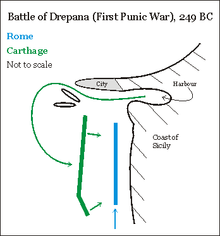| Adherbal | |
|---|---|
| Native name | 𐤀𐤃𐤓𐤁𐤏𐤋 |
| Other name(s) | Atarbas |
| Died | 230 BC |
| Allegiance | Carthage |
| Rank | Admiral |
| Battles / wars | First Punic War |

Adherbal (Punic: 𐤀𐤃𐤓𐤁𐤏𐤋, ʾDRBʿL; died 230 BC), also known as Atarbas (Ancient Greek: Ατάρβας, Atárbas), was the admiral of the Carthaginian fleet which battled the Romans for domination of the Mediterranean Sea during the First Punic War (264–241 BC). Polybius identified Adherbal during the Battle of Drepana as the Carthaginian commander-in-chief. He led the Carthaginian fleet to Drepana in Sicily and inflicted a crushing defeat on the Roman consul P. Claudius Pulcher during the naval battle in 249 BC.
Battle of Drepana
Encouraged by previous victories, the new consul for 250 Gaius Atilius Regulus launched a campaign to attack the last Punic strongholds on the island of Sicily: Lilybaeum and Drepana. For this surprise attack, which was carried out in 249, the Romans mustered a fleet of 123 quinqueremes. Adherbal was tasked to defend Drepana with the assistance of Hannibal the Rhodian and Carthalo. In their desire for stealth, the Romans attacked at night causing them to lose their formation. Adherbal commanded the Punic fleet and immediately ordered his forces to set to sea when the straggling line of Roman galleys approached the shore by dawn. His defense cost the Romans 93 ships while Carthage lost nothing.
Adherbal's conduct during the siege was documented by historians such as Polybius and Leonardo Bruni. The latter, for instance, described the admiral delivering an oratio obliqua before his forces as he led them to meet the Romans. He would later write that Adherbal "won great praise as the man who, by virtue of his courage and skill, restored to his fellow Carthaginians their lost reputation as a sea power."
References
Citations
- Huss (1985), p. 559.
- Polybius (3 June 2018). The Histories of Polybius: Vol. I & II. e-artnow. ISBN 978-80-268-9412-4.
- Polybius, i. 49—52
- Diod., Ecl. xxiv
- ^ Hoyos, Dexter (2015). Mastering the West: Rome and Carthage at War. Oxford: Oxford University Press. pp. 56–58. ISBN 978-0-19-986010-4.
- ^ Carey, Brian Todd; Allfree, Joshua B.; Cairns, John (2007). Hannibal's Last Battle: Zama & The Fall of Carthage. Pen and Sword. ISBN 978-1-4738-1481-3.
- Hoyos, Dexter (2015). A Companion to the Punic Wars. Malden, MA: John Wiley & Sons. p. 160. ISBN 978-1-4051-7600-2.
- ^ Grant, R. G. (2011). Battle at Sea: 3,000 Years of Naval Warfare. New York: DK Publishing. p. 45. ISBN 978-0-7566-7186-0.
- ^ Ianziti, Gary (2012). Writing History in Renaissance Italy. Cambridge, MA: Harvard University Press. p. 79. ISBN 978-0-674-06152-1.
Bibliography
- Huss, Werner (1985), Geschichte der Karthager, Munich: C.H. Beck, ISBN 9783406306549. (in German)

